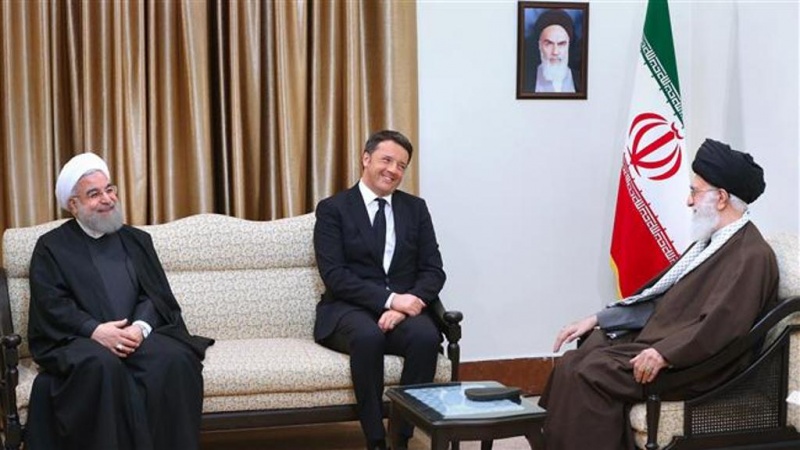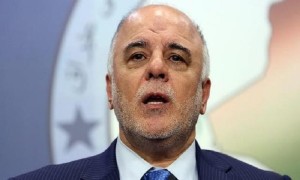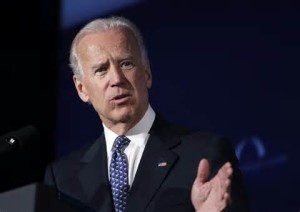April 15, 2016

The United States and Iran plus Iraq’s Shiite Grand Ayatollah Ali al-Sistani and clerical firebrand Muqtada as-Sadr have formed an unlikely alliance to support Iraq’s prime minister as he challenges the ruling and generally corrupt elite with plans for a non-political cabinet of technocrats to fight corruption.
Calls for Haider al-Abadi’s removal–including one from his predecessor as prime minister, Nuri al-Maliki—had been growing as he pursued a reshuffle aimed at addressing graft, which became a major issue after oil prices collapsed in 2014 and strained the government’s finances.
Reuters reports that both Washington and Tehran put pressure on their respective allies in Iraq not to unseat Abadi. The US effort was led by Vice President Joe Biden while Gen. Qassem Soleymani of the Qods Force led the Iranian effort. US Secretary of State John Kerry flew into Baghdad last Friday to add his muscle.
Reuters said the US and Iranian efforts helped stave off an attempt last month to unseat Abadi by Maliki, the head of the Shiite Dawa party that controls nearly a third of the seats in parliament. Maliki denied the attempt.
Abadi has presented parliament with a list of 14 names, many of them academics, to free the ministries from the grip of a political class that has used the system of ethnic and sectarian quotas instituted after the US-led invasion in 2003 to amass wealth and influence through corruption. As yet there has been no vote on the list by Parliament.
The proposal, which threatens to weaken patronage networks that sustain the elite’s wealth and influence, shocked the political establishment that has ruled Iraq since the removal of Saddam Hussein, including Abadi’s own Dawa party, the Shiite Islamic Supreme Council of Iraq (ISCI) (which was originally founded in Iran during the Iran-Iraq War) and the Kurdish alliance.

Sadr, who used to devote his effort to denouncing the Americans and demanding they leave Iraq, has become the most vocal proponent of a non-political cabinet.
Vice President Biden and General Soleymani made clear before Abadi’s cabinet announcement that no attempt should be made to unseat him, so as to keep up momentum in the war on the Islamic State, sources with knowledge of the matter told Reuters.
Iraqis face high unemployment, continuing power cuts and poor public services, fueling resentment against a ruling class accused of squandering revenues earned over a decade of high oil prices. The country ranks 161 out of 168 on Transparency Inter-national’s Corruption Perceptions Index.
Sistani gave Abadi cover last summer to make reforms following street protests demanding better public services. Though frustrated with the premier’s failure to take decisive action, Sistani’s backing has not wavered, according to politicians and analysts.
The Americans, the Iranians, Sadr and Sistani all had the same view: “Abadi stays in power and puts new ministers in,” said Sajad Jiyad, an analyst who advises the prime minister.
Hours before Abadi announced his proposed cabinet list, Maliki signaled that the Abadi could be ousted with the consent of other blocs, senior officials said.

He was demanding a complete change of the government including Abadi, said Hussein al-Shahristani, outgoing minister of higher education. Mowaffak al-Rubaie, a senior Shiite lawmaker, said Maliki was even willing to accept a replacement from outside the Dawa party.
A spokesman for Maliki denied he had tried to unseat Abadi, but said the State of Law coalition Maliki leads would not block other parties from replacing him “as long as the political process is preserved.”
But Abadi stood firm, boosted by a call from Biden whose message Jiyad said was resounding: “You’re our last hope in Iraq.”
Iran has conveyed a similar message to Iraqi politicians. Soleymani met representatives of Maliki and ISCI leader Ammar al-Hakim, said a Shiite politician familiar with the discussions.
“Both the Americans and the Iranians wanted to avoid Abadi getting unseated,” said Jiyad. Ironically, Soleymani two years ago tried to block Abadi from replacing Maliki. Abadi was being supported then by the United States and Sistani.
Abadi was also emboldened to sack his politically appointed cabinet by pressure from the followers of Sadr.
Dismayed with the slow pace of reforms, Sistani had decided in early February to stop addressing politics in his weekly sermons as a way to prod Abadi into action.
Sadr, who rose to prominence a decade ago when his followers fought US troops, quickly filled the silence. He rallied supporters to sit in at the gates of Baghdad’s fortified Green Zone, which houses embassies, government offices and parliament.
He then launched his own five-day sit-in under a tent inside the Green Zone to force Abadi to draft a government of technocrats and warned party leaders they would face street protests if they obstructed him.
Abadi went to parliament last month with the full cabinet line-up in one hand and a second partial reshuffle in the other, two lawmakers said. After a 90-minute meeting with the parliament speaker, he emerged with the full list and asked lawmakers to accept, reject or amend it.
As if on cue, Sadr ended the sit-ins with a speech from his tent, praising the prime minister’s move as “courageous.”
Parliament is still mulling Abadi’s nominations, who are not well-known and were chosen without consulting the political parties.
The candidate for oil minister subsequently withdrew under apparent pressure from Kurdish leaders who objected to having no say in who would represent their community.
Most political groups are not happy with nominees put forward without consultation, except for the Sadrists, who also said Abadi’s list could be amended so long as new candidates are not affiliated with political parties.
Lawmakers and analysts expect parliament to reject up to half the list, but that will not be an issue for Abadi as long as he eventually gets enough
politically independent experts in place.
